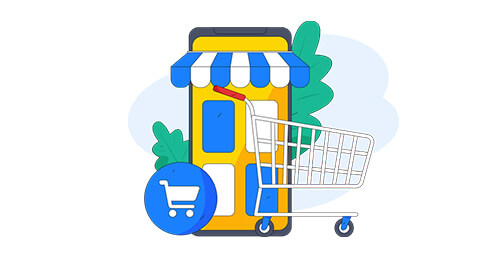

Kubernetes has become a cornerstone in cloud-native applications, particularly in the retail and e-commerce industry. As per the annual survey of the Cloud Native Computing Foundation (CNCF), Kubernetes adoption has skyrocketed, reaching 96% among enterprises. Originally developed by Google Cloud and released as an open-source platform in 2014, Kubernetes is a robust Container Management Platform, which automates operational tasks related to container management. With the built-in commands for deploying applications, rolling out changes, scaling resources, and monitoring performance, Kubernetes for retail digital transformation works towards simplifying application management and empowers businesses to respond to the dynamic demands of the industry. In this blog, we will explore how Kubernetes is transforming the retail industry, the challenges with legacy infrastructure, and the benefits it can bring including security, scalability, and reliability.
Transform Your Retail Operations With Kubernetes
With almost 7.8 billion daily e-commerce transactions globally, the juggernaut of digital commerce growth has forced retailers to rethink how they can work towards managing their operations and engaging their customers. In India, the number of online shoppers is expected to increase by over 200% by 2030. This growth demands that retailers have scalable and reliable solutions that can help build a robust omnichannel strategy. This makes Kubernetes a must-have for businesses looking to stay ahead of the curve. The platform helps in modernizing application infrastructure and overcoming legacy limits to meet the accelerated demands of the market.
Growing Adoption of Kubernetes Across Industries
In recent years, we have seen unmistakable traction in digital sales across industries, particularly in the retail and e-commerce industries. Retailers generally face mounting pressure to work towards increasing sales while maintaining profit margins. The current revolution of digital commerce has created new opportunities by enabling businesses to reach global customers through various online platforms. Kubernetes helps retailers with such requirements by providing scalable solutions that would ensure better customer experiences, even during peak shopping periods.
Addressing Challenges in the Traditional Retail Infrastructure
Traditional retail infrastructure usually relies on outdated systems that are not well-equipped to meet the demands of the fast-paced digital environment. This limitation can lead to many challenges including:
- Bottlenecks in Legacy Systems: Building on legacy systems can restrict the integration of modern applications and disable businesses from adapting quickly to mobile commerce trends. These bottlenecks hinder business growth by preventing them from delivering dynamic and responsive experiences to their customers.
- Scalability And Flexibility Issues: E-commerce platforms need to be equipped to handle the surges in demand during peak shopping events. With the traditional infrastructure, it often fails to scale efficiently, resulting in slowdowns, website crashes, or even poor user experience.
Benefits of Kubernetes for Retail Digital Transformation
Kubernetes for retail and e-commerce provides businesses with a robust solution to these challenges, offering several key advantages and helping them stay ahead of the curve. :
- Automation of Operations: Kubernetes automates the key operational tasks that are related to container management, which includes deployment, scaling, and maintenance. By automating the day-to-day operations along with its command line interface, it ensures that the applications run smoothly with minimal manual intervention.
- Infrastructure Abstraction: Kubernetes manages the underlying infrastructure, allowing businesses to focus on building and optimizing applications, rather than managing computing, networking, and storage resources. This helps to enhance operational efficiency and reduce the complexity of managing distributed systems.
- High availability: Kubernetes aims towards making sure that the platform’s reliability is provided via its self-healing capabilities and multi-zoned deployments to guarantee service availability, even when there are situations of servers or data center failures.
- Security: Kubernetes implements several security features, which include Role-based Access Control (RBAC), image vulnerability, scanning, and secure communication between the components, ensuring that retail businesses can safeguard and protect customer data, payment information, and order history.
Kubernetes- Case Studies and Use Cases
Niveus is leveraging Kubernetes to provide businesses across industries with impactful outcomes, enabling them to scale their business, optimize performance, and deliver better user experiences. Here are a few of our notable case studies where Kubernetes played a crucial role in digital transformation:
- HDFC ERGO developed a Super App for 1.5 lakh+ Insurance Advisors and facilitated seamless customer management. Niveus developed a sales super app that is powered by Kubernetes on Google Cloud, which now ensures a smooth user experience and boosts efficiency in operations.
- Mahindra and Mahindra were looking for a robust digital platform to launch their latest vehicle – the Mahindra 3X0. For this platform, we enabled their online launch by building a cloud-native infrastructure using Kubernetes, that enables seamless scaling up during peak traffic and ensures a flawless product launch. This provided Mahindra with flexibility and minimized latency during high demand.
- While helping Bobble AI migrate to GCP, we leveraged Kubernetes to optimize their infrastructure, reduce cost, and improve scalability. The migration resulted in efficient performance, high availability, and substantial cost savings, which enabled Bobble.AI to offer an improved user experience with greater operational efficiency.
Best Practices for Implementing Kubernetes in Retail and E-Commerce
When implementing Kubernetes for retail digital transformation, following the best practices is essential to ensure a smooth transition and maximize the benefits:
- Infrastructure as Code(IaC): By leveraging IaC, businesses can automate the provisioning and management of their infrastructure, which helps ensure a consistent environment. Version-controlled configuration files will help in the elimination of human error, improving the deployment speed and increasing the reliability of their infrastructure.
- Microservices architecture: Kubernetes is well suited for the microservice-based architecture, where there is a breakdown of the application into smaller independent services which can then be scaled up individually.
- CI/CD Pipelines: Implementing continuous integration (CI) and Continuous Deployment pipelines is crucial for enhancing the development and deployment of new features, fixes, and updates. Kubernetes can automate the workflows, enabling faster, secure releases without disrupting the rest of the application and the user experience.
The Future of Kubernetes for Retail And E-commerce
As the retail landscape continues to grow, Kubernetes for retail digital transformation is poised to play a more integral role in shaping the future and maximizing business benefits:
- Serverless Kubernetes: Serverless Kubernetes eliminates the requirement of the business to configure and manage their own Kubernetes cluster. Serverless Kubernetes eliminates the need for businesses to configure and manage their own Kubernetes clusters. This reduces the infrastructure overhead, making it accessible and affordable for startups and smaller organizations. The pay-as-you-go model further benefits the business and ensures cost efficiency by charging only for the resources consumed.
- AI and Machine learning: AI and ML are increasingly becoming an integral part of the personalized customer experience and demand forecasting in retail. Kubernetes provides an ideal platform for the deployment and scaling of AI/ML models. This enables the retailers to process a large amount of data to obtain real-time recommendations and accurate demand predictions.
- WASM-WebAssembly Integration: WASM is gaining traction due to faster performance, smaller size, and enhanced security. In retail and e-commerce, WASM offers a fast and efficient alternative to containers, particularly for serverless workloads like that of real-time data processing and personalized recommendations. When combined with Kubernetes, WASM drives innovation and improves scalability, offering both performance and flexibility in a cloud-native environment.
Conclusion
Kubernetes is reshaping the retail and e-commerce landscape by addressing the traditional infrastructure challenges, enabling better security and high availability, and scaling up the applications in response to fluctuating demand. As the retail sphere continues with its digital transformation, Kubernetes on Google Cloud stands at the forefront of providing innovative, secure, and scalable solutions that will help businesses deliver efficient customer experience. At Niveus, we recognize the transformative potential of Kubernetes and are committed to helping the retail and e-commerce business drive growth with the technology and harness the power to achieve operational excellence











